Thomas James Richards, Diaries, Transcript Vol. 2 - Part 25
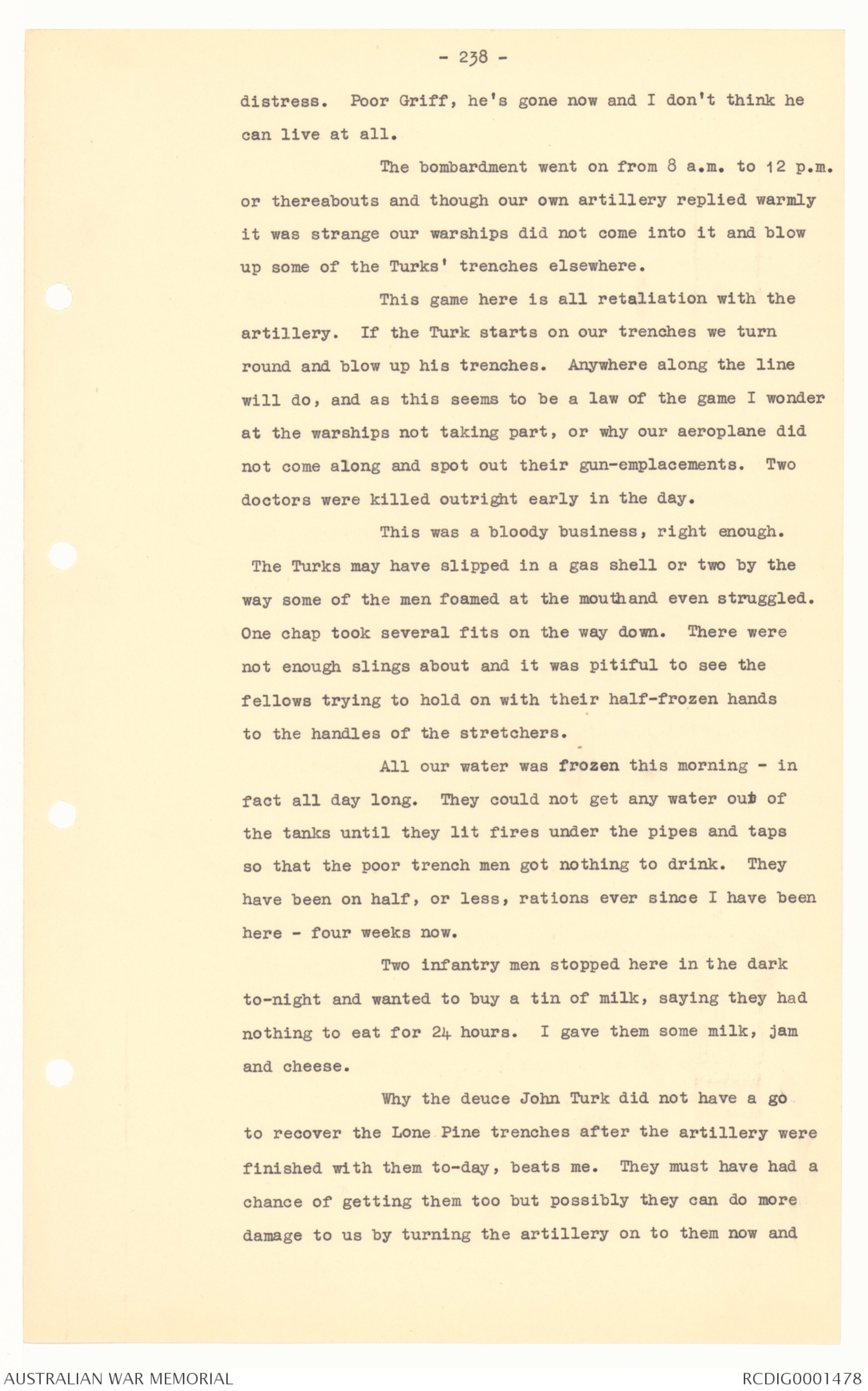
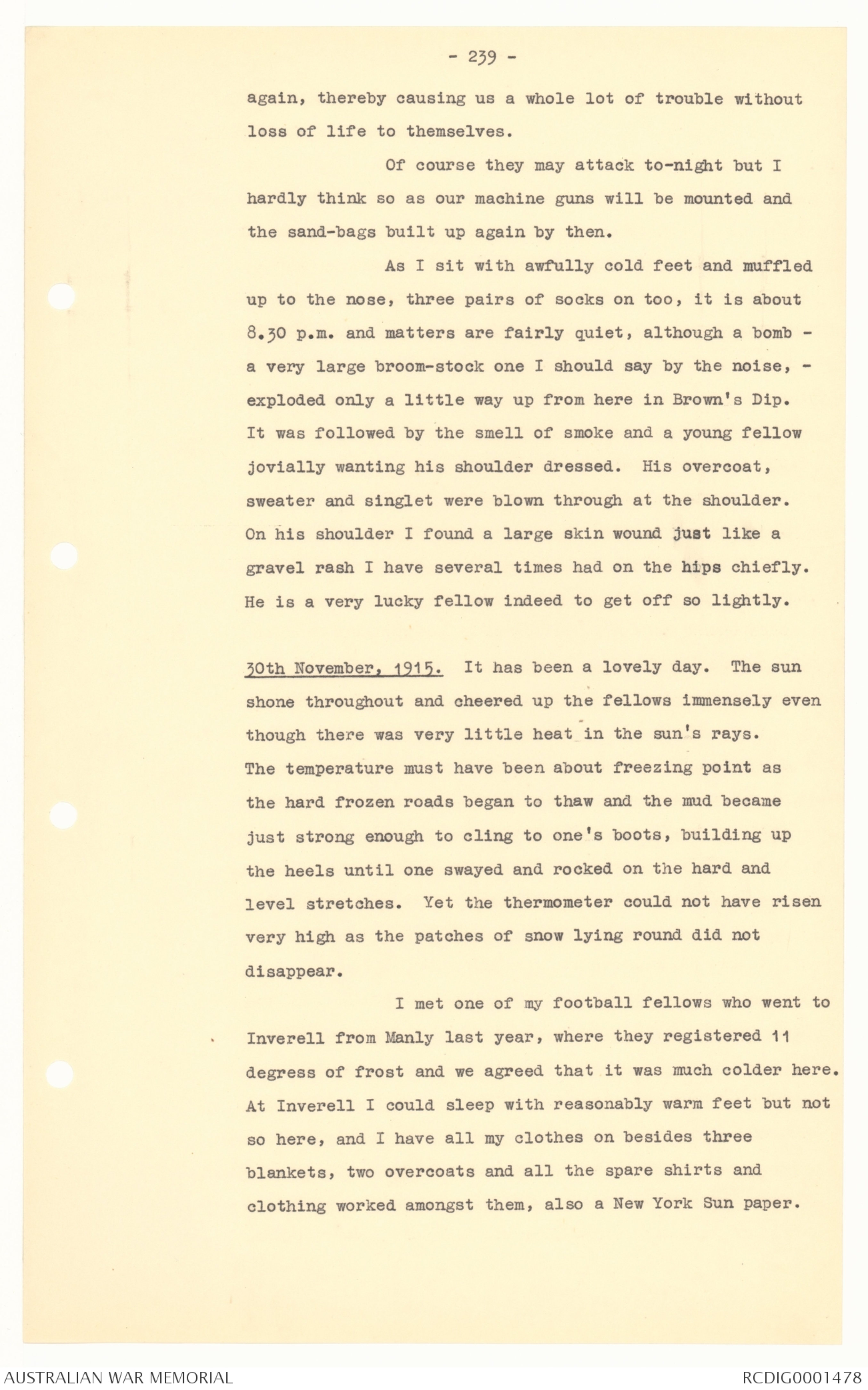
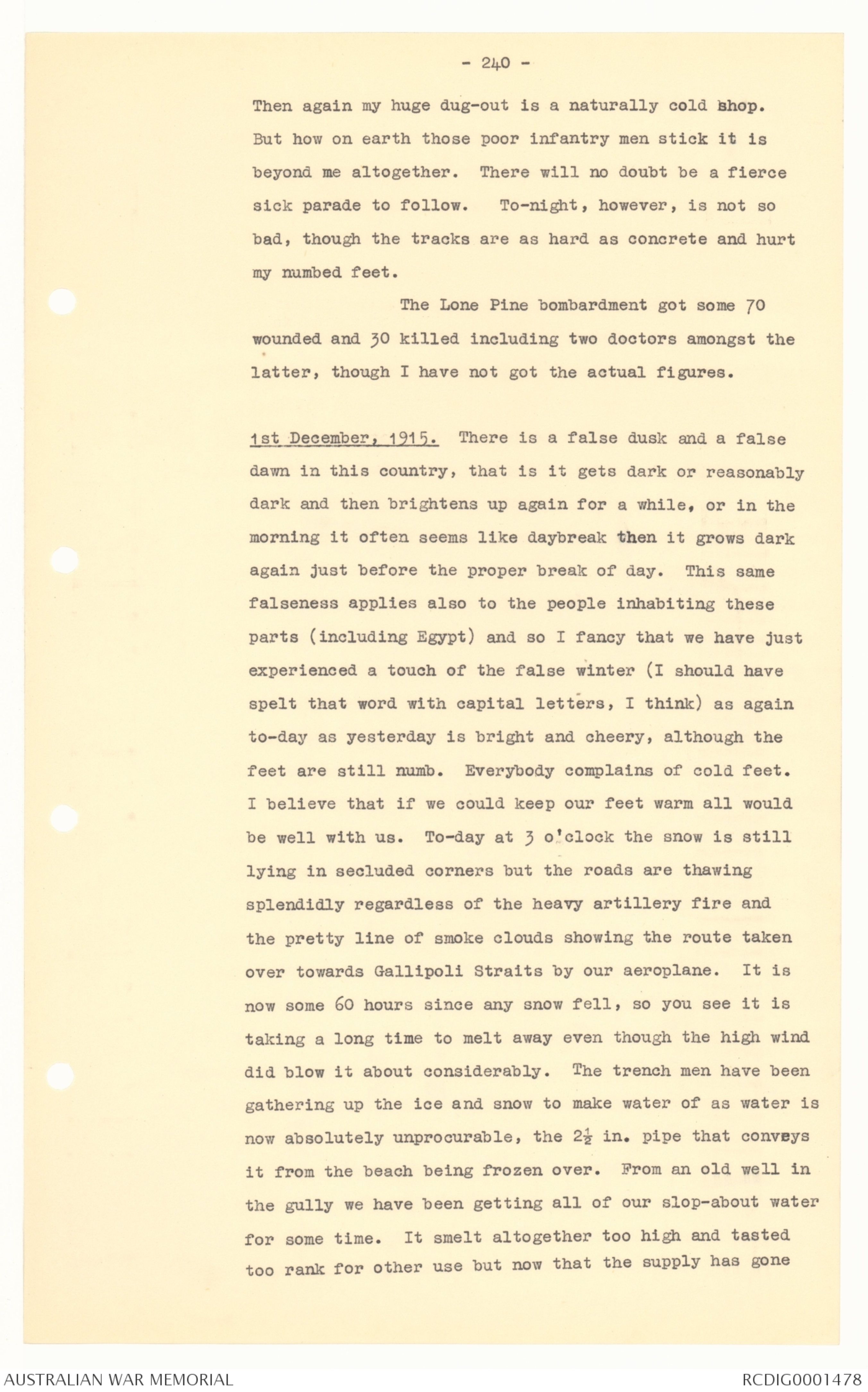
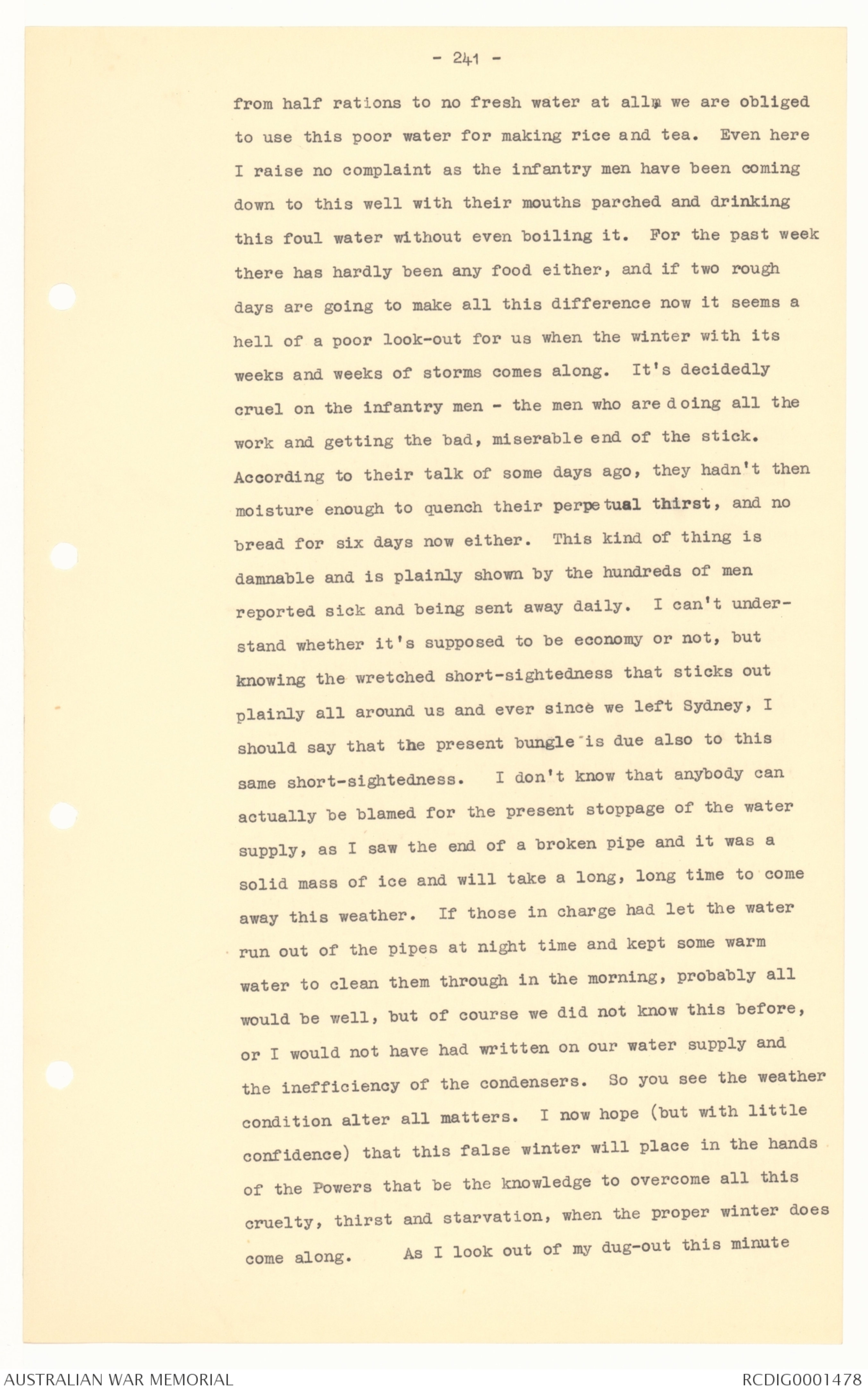
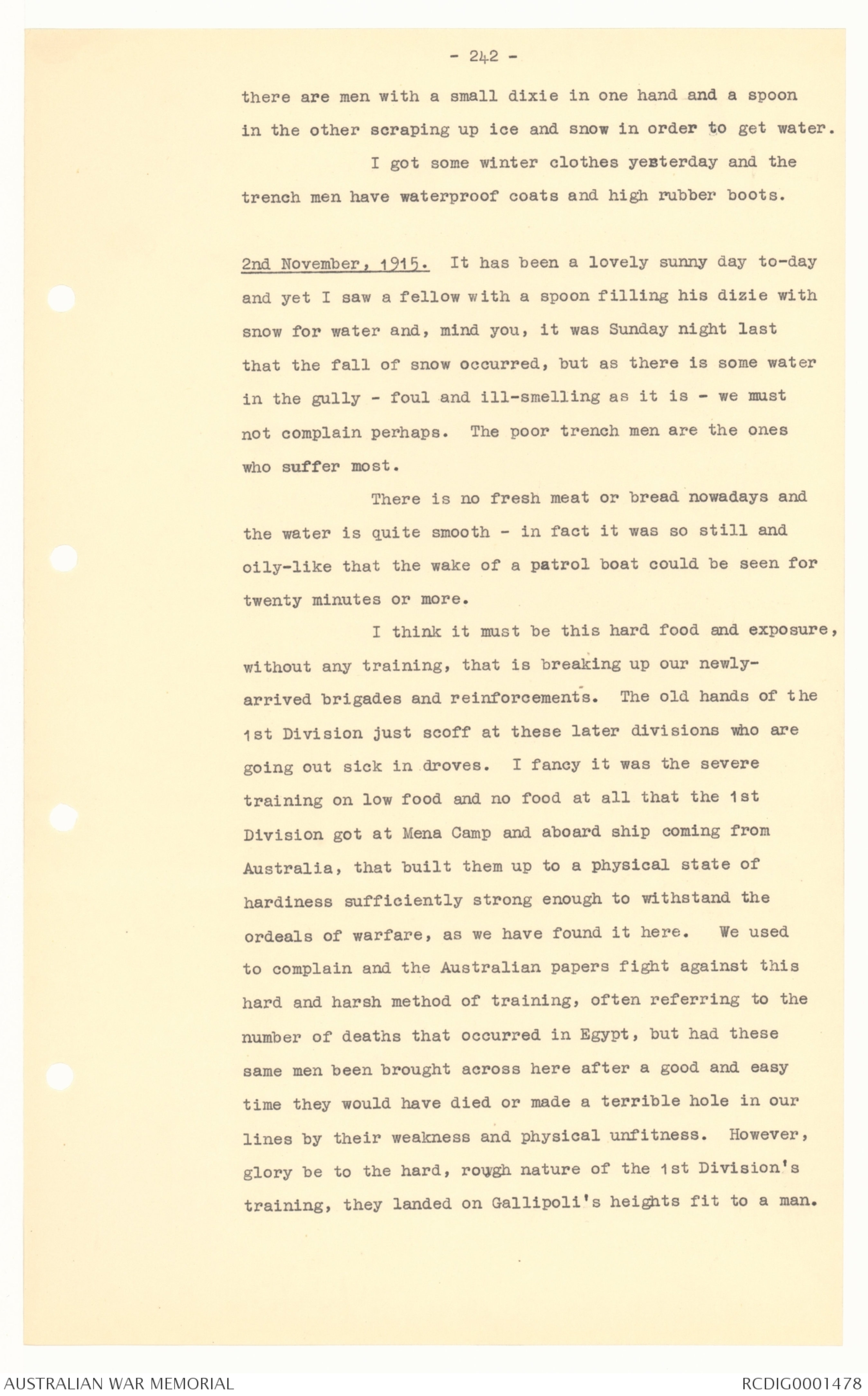
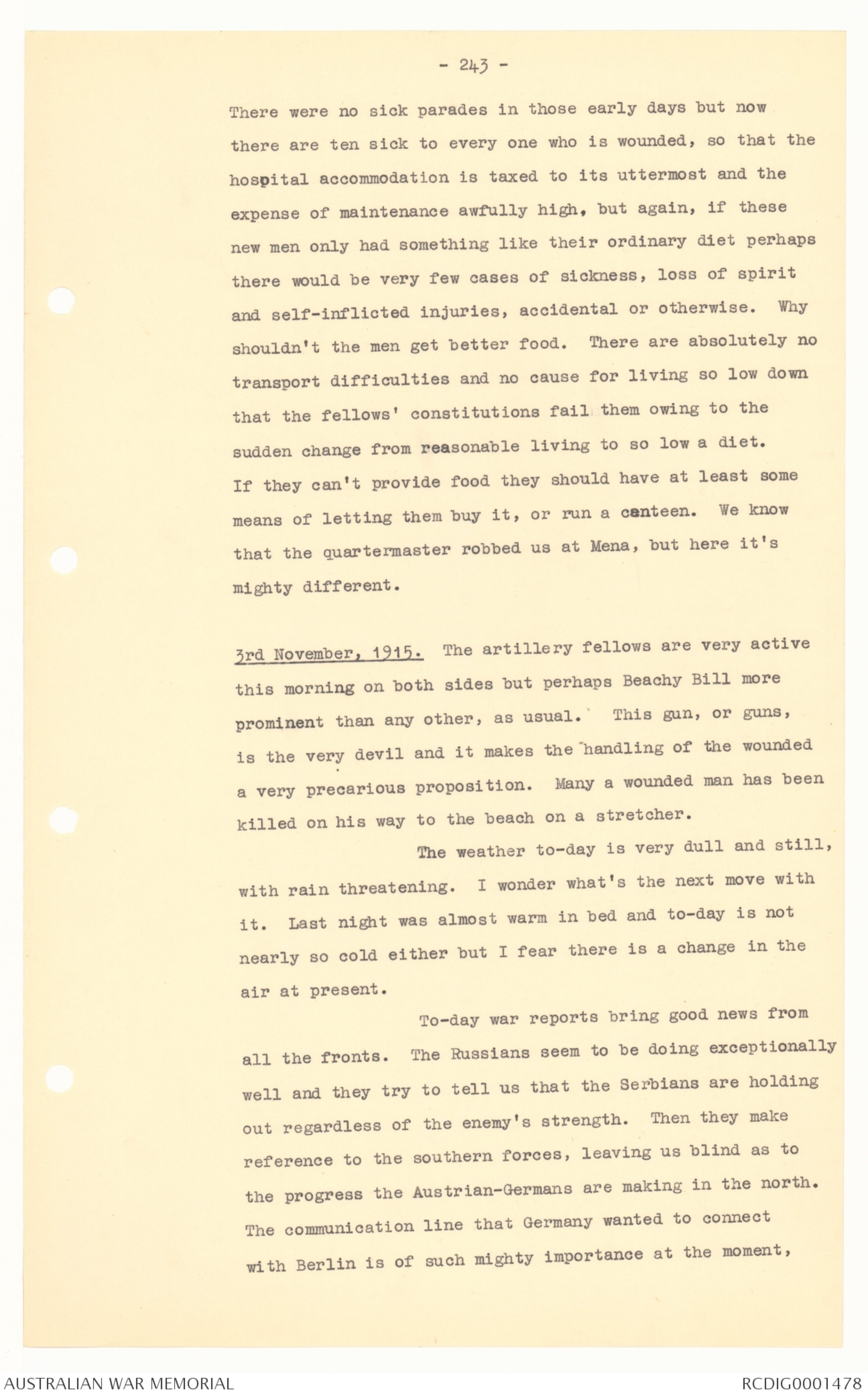
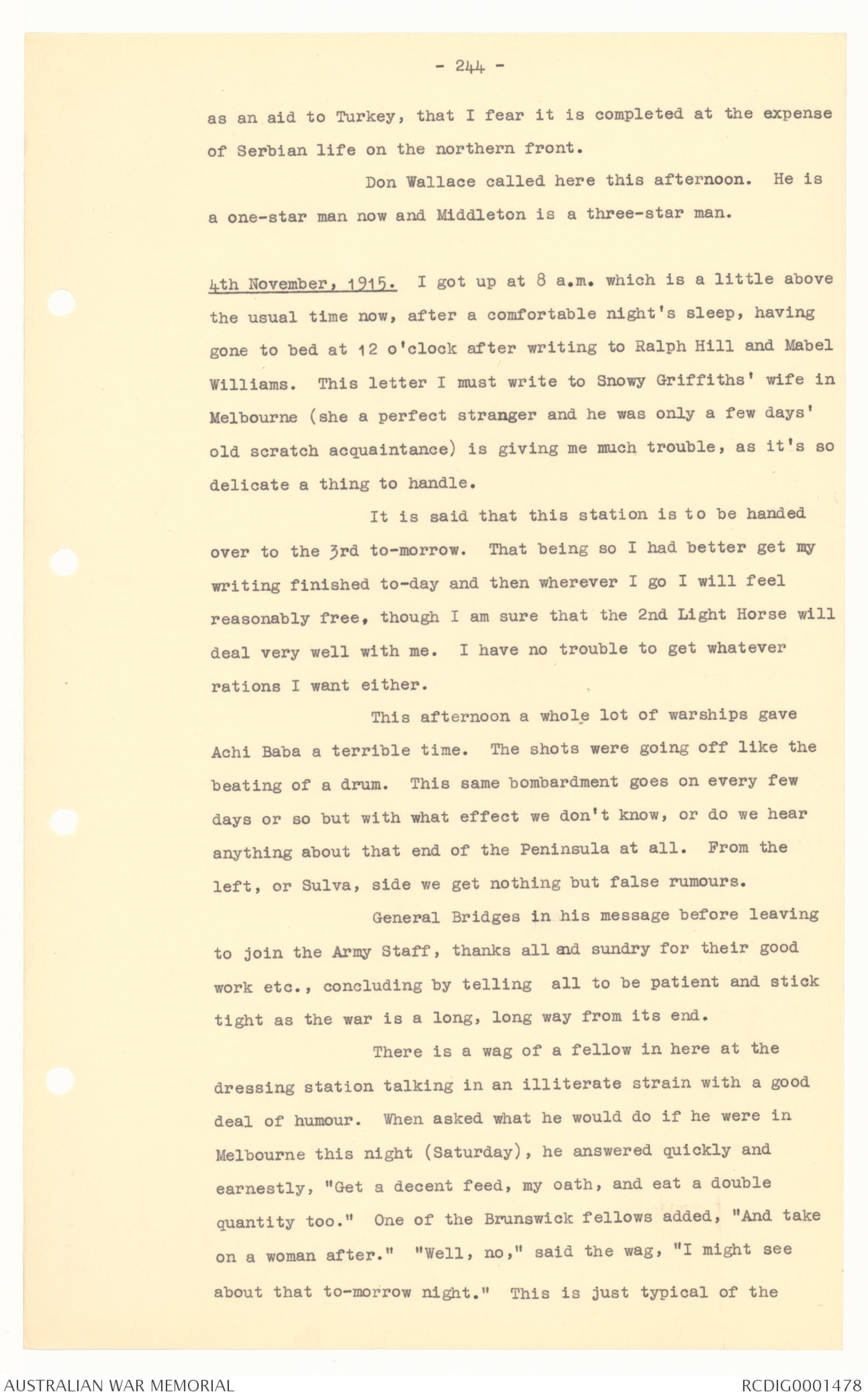
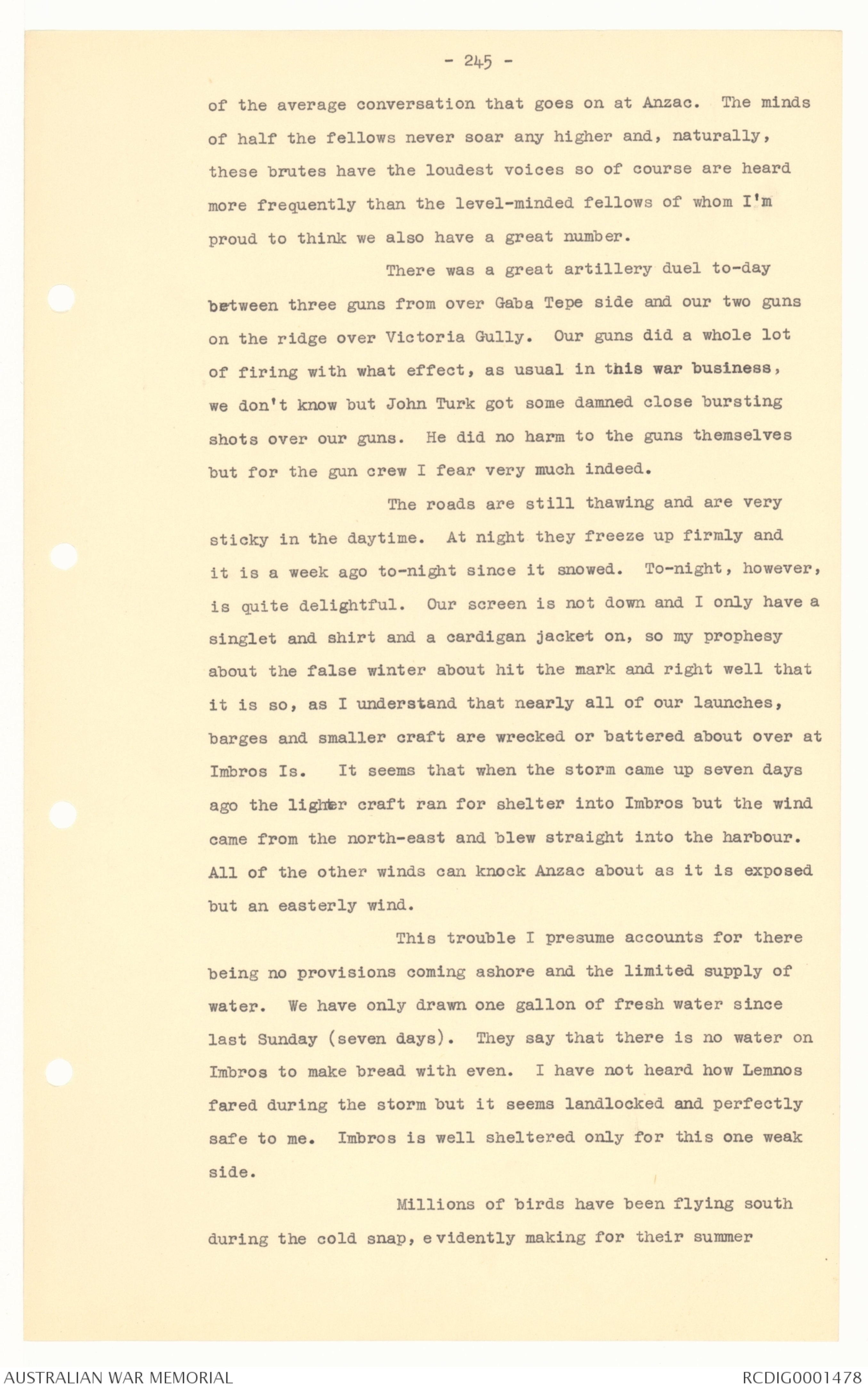
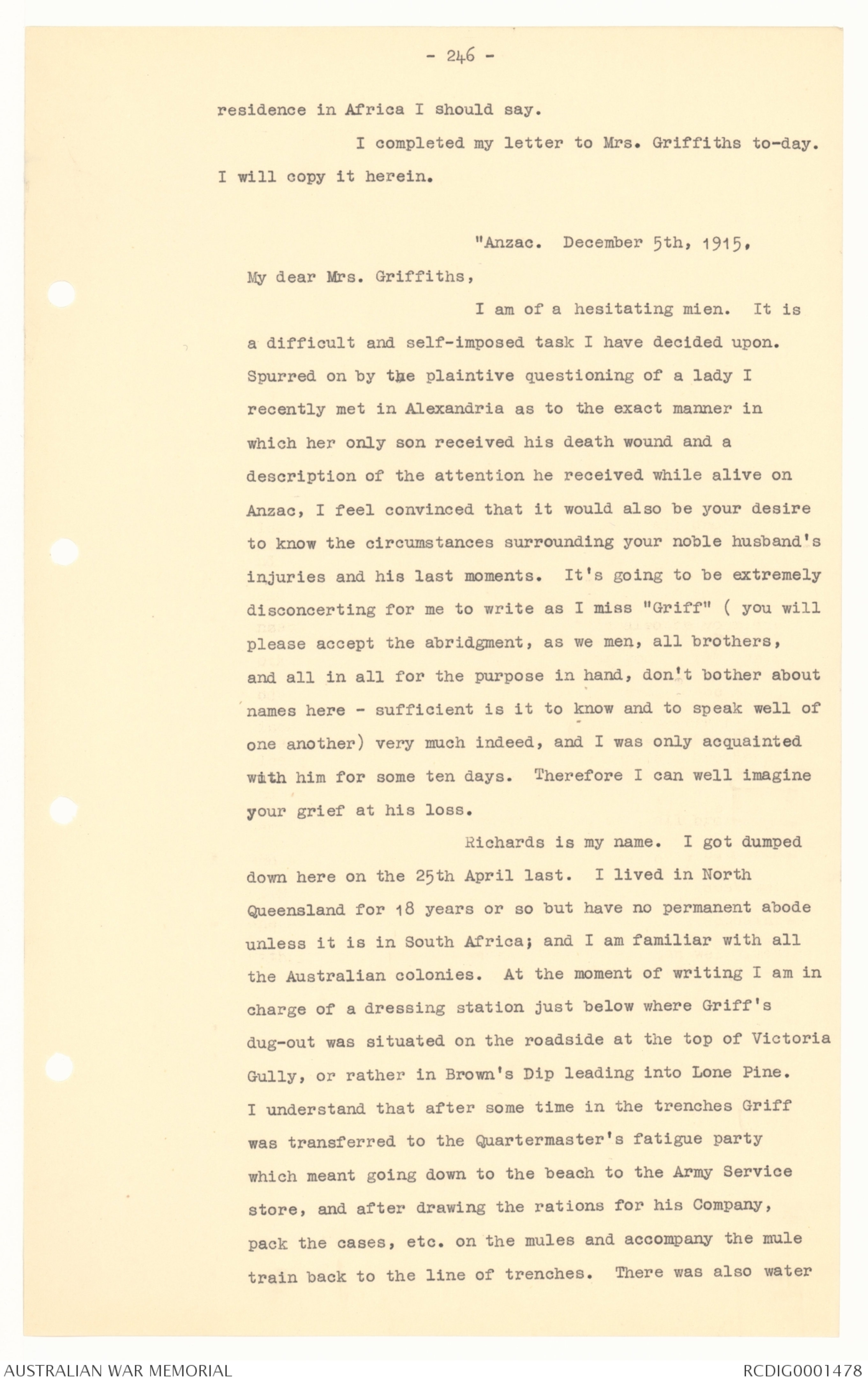
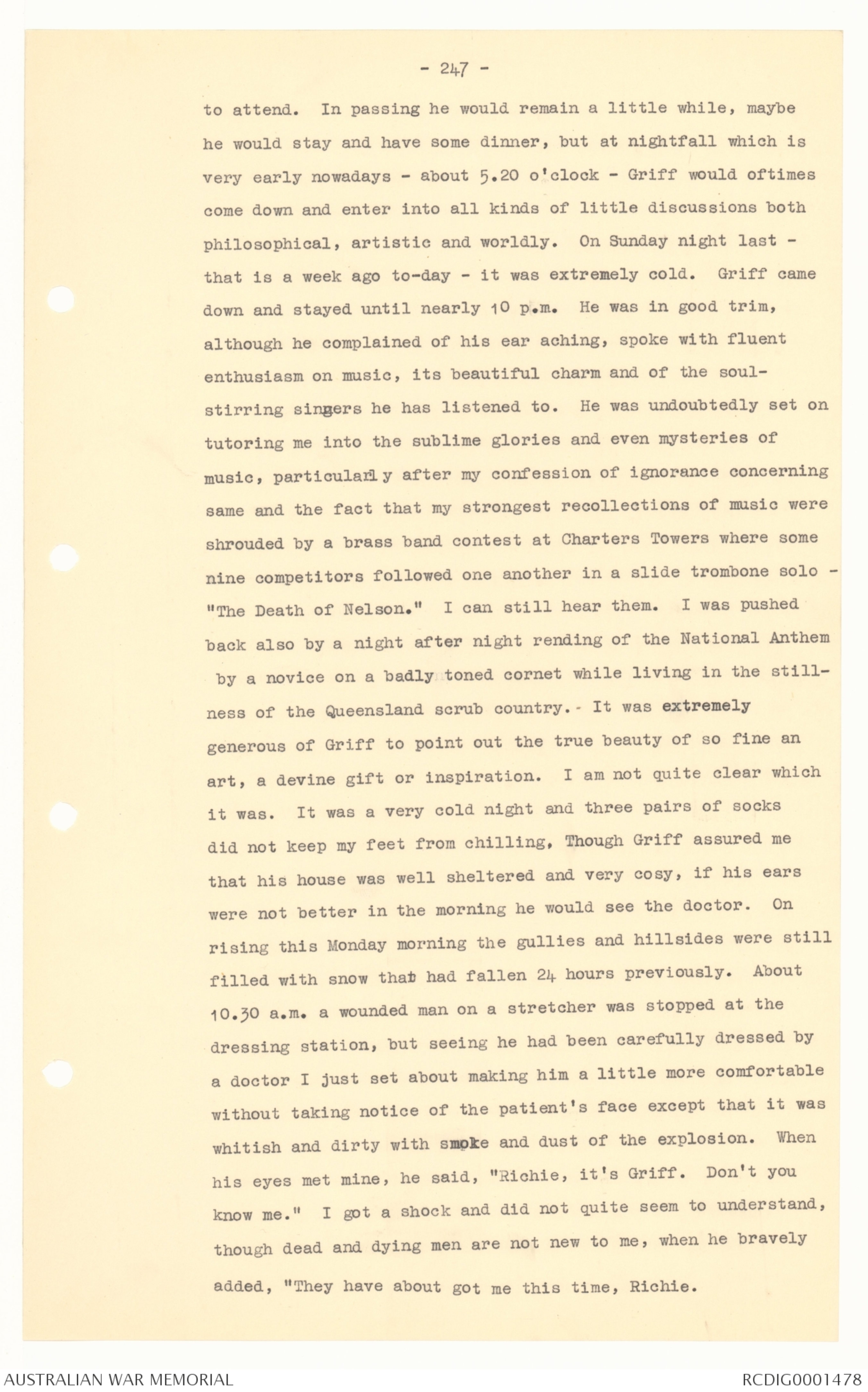
-238 -
distress. Poor Griff, he's gone now and I don't think he
can live at all.
The bombardment went on from 8 a.m. to 12 p.m.
or thereabouts and though our own artillery replied warmly
it was strange our warships did not come into it and blow
up some of the Turks' trenches elsewhere.
This game here is all retaliation with the
artillery. If the Turk starts on our trenches we turn
round and blow up his trenches. Anywhere along the line
will do, and as this seems to be a law of the game I wonder
at the warships not taking part, or why our aeroplane did
not come along and spot out their gun-emplacements. Two
doctors were killed outright early in the day.
This was a bloody business, right enough.
The Turks may have slipped in a gas shell or two by the
way some of the men foamed at the mouth and even struggled.
One chap took several fits on the way down. There were
not enough slings about and it was pitiful to see the
fellows trying to hold on with their half-frozen hands
to the handles of the stretchers.
All our water was frozen this morning - in
fact all day long. They could not get any water out of
the tanks until they lit fires under the pipes and taps
so that the poor trench men got nothing to drink. They
have been on half, or less, rations ever since I have been
here - four weeks now.
Two infantry men stopped here in the dark
to-night and wanted to buy a tin of milk, saying they had
nothing to eat for 24 hours. I gave them some milk, jam
and cheese.
Why the deuce John Turk did not have a go
to recover the Lone Pine trenches after the artillery were
finished with them to-day, beats me. They must have had a
chance of getting them too but possibly they can do more
damage to us by turning the artillery on to them now and
-239 -
again, thereby causing us a whole lot of trouble without
loss of life to themselves.
Of course they may attack to-night but I
hardly think so as our machine guns will be mounted and
the sand-bags built up again by then.
As I sit with awfully cold feet and muffled
up to the nose, three pairs of socks on too, it is about
8.30 p.m. and matters are fairly quiet, although a bomb-
a very large broom-stock one I should say by the noise, -
exploded only a little way up from here in Brown's Dip.
It was followed by the smell of smoke and a young fellow
jovially wanting his shoulder dressed. His overcoat,
sweater and singlet were blown through at the shoulder.
On his shoulder I found a large skin wound just like a
gravel rash I have several times had on the hips chiefly.
He is a very lucky fellow indeed to get off so lightly.
30th November, 1915. It has been a lovely day. The sun
shone throughout and cheered up the fellows immensely even
though there was very little heat in the sun's rays.
The temperature must have been about freezing point as
the hard frozen roads began to thaw and the mud became
just strong enough to cling to one's boots, building up
the heels until one swayed and rocked on the hard and
level stretches. Yet the thermometer could not have risen
very high as the patches of snow lying round did not
disappear.
I met one of my football fellows who went to
Inverell from Manly last year, where they registered 11
degress of frost and we agreed that it was much colder here.
At Inverell I could sleep with reasonably warm feet but not
so here, and I have all my clothes on besides three
blankets, two overcoats and all the spare shirts and
clothing worked amongst them, also a New York Sun paper.
-240 -
Then again my huge dug-out is a naturally cold shop.
But how on earth those poor infantry men stick it is
beyond me altogether. There will no doubt be a fierce
sick parade to follow. To-night, however, is not so
bad, though the tracks are as hard as concrete and hurt
my numbed feet.
The Lone Pine bombardment got some 70
wounded and 30 killed including two doctors amongst the
latter, though I have not got the actual figures.
1st December, 1915. There is a false dusk and a false
dawn in this country, that is it gets dark or reasonably
dark and then brightens up again for a while, or in the
morning it often seems like daybreak then it grows dark
again just before the proper break of day. This same
falseness applies also to the people inhabiting these
parts (including Egypt) and so I fancy that we have just
experienced a touch of the false winter (I should have
spelt that word with capital letters, I think) as again
to-day as yesterday is bright and cheery, although the
feet are still numb. Everybody complains of cold feet.
I believe that if we could keep our feet warm all would
be well with us. To-day at 3 o'clock the snow is still
lying in secluded corners but the roads are thawing
splendidly regardless of the heavy artillery fire and
the pretty line of smoke clouds showing the route taken
over towards Gallipoli Straits by our aeroplane. It is
now some 60 hours since any snow fell, so you see it is
taking a long time to melt away even though the high wind
did blow it about considerably. The trench men have been
gathering up the ice and snow to make water of as water is
now absolutely unprocurable, the 2½ in. pipe that conveys
it from the beach being frozen over. From an old well in
the gully we have been getting all of our slop-about water
for some time. It smelt altogether too high and tasted
too rank for other use but now that the supply has gone
-241-
from half rations to no fresh water at allm we are obliged
to use this poor water for making rice and tea. Even here
I raise no complaint as the infantry men have been coming
down to this well with their mouths parched and drinking
this foul water without even boiling it. For the past week
there has hardly been any food either, and if two rough
days are going to make all this difference now it seems a
hell of a poor look-out for us when the winter with its
weeks and weeks of storms comes along. It's decidedly
cruel on the infantry men - the men who are doing all the
work and getting the bad, miserable end of the stick.
According to their talk of some days ago, they hadn’t then
moisture enough to quench their perpetual thirst, and no
bread for six days now either. This kind of thing is
damnable and is plainly shown by the hundreds of men
reported sick and being sent away daily. I can't understand
whether it's supposed to be economy or not, but
knowing the wretched short-sightedness that sticks out
plainly all around us and ever since we left Sydney, I
should say that the present bungle is due also to this
same short-sightedness. I don't know that anybody can
actually be blamed for the present stoppage of the water
supply, as I saw the end of a broken pipe and it was a
solid mass of ice and will take a long, long time to come
away this weather. If those in charge had let the water
run out of the pipes at night time and kept some warm
water to clean them through in the morning, probably all
would be well, but of course we did not know this before,
or I would not have had written on our water supply and
the inefficiency of the condensers. So you see the weather
condition alter all matters. I now hope (but with little
confidence) that this false winter will place in the hands
of the Powers that be the knowledge to overcome all this
cruelty, thirst and starvation, when the proper winter does
come along. As I look out of my dug-out this minute
-242 -
there are men with a small dixie in one hand and a spoon
in the other scraping up ice and snow in order to get water.
I got some winter clothes yesterday and the
trench men have waterproof coats and high rubber boots.
2nd November, 1915. It has been a lovely sunny day to-day
and yet I saw a fellow with a spoon filling his dizie with
snow for water and, mind you, it was Sunday night last
that the fall of snow occurred, but as there is some water
in the gully - foul and ill-smelling as it is - we must
not complain perhaps. The poor trench men are the ones
who suffer most.
There is no fresh meat or bread nowadays and
the water is quite smooth - in fact it was so still and
oily-like that the wake of a patrol boat could be seen for
twenty minutes or more.
I think it must be this hard food and exposure,
without any training, that is breaking up our newly-arrived brigades and reinforcements. The old hands of the
1st Division just scoff at these later divisions who are
going out sick in droves. I fancy it was the severe
training on low food and no food at all that the 1st
Division got at Mena Camp and aboard ship coming from
Australia, that built them up to a physical state of
hardiness sufficiently strong enough to withstand the
ordeals of warfare, as we have found it here. We used
to complain and the Australian papers fight against this
hard and harsh method of training, often referring to the
number of deaths that occurred in Egypt, but had these
same men been brought across here after a good and easy
time they would have died or made a terrible hole in our
lines by their weakness and physical unfitness. However,
glory be to the hard, rough nature of the 1st Division's
training, they landed on Gallipoli's heights fit to a man.
-243 -
There were no sick parades in those early days but now
there are ten sick to every one who is wounded, so that the
hospital accommodation is taxed to its uttermost and the
expense of maintenance awfully high, but again, if these
new men only had something like their ordinary diet perhaps
there would be very few cases of sickness, loss of spirit
and self-inflicted injuries, accidental or otherwise. Why
shouldn't the men get better food. There are absolutely no
transport difficulties and no cause for living so low down
that the fellows' constitutions fail them owing to the
sudden change from reasonable living to so low a diet.
If they can't provide food they should have at least some
means of letting them buy it, or run a canteen. We know
that the quartermaster robbed us at Mena, but here it's
mighty different.
3rd November, 1915. The artillery fellows are very active
this morning on both sides but perhaps Beachy Bill more
prominent than any other, as usual. This gun, or guns,
is the very devil and it makes the handling of the wounded
a very precarious proposition. Many a wounded man has been
killed on his way to the beach on a stretcher.
The weather to-day is very dull and still,
with rain threatening. I wonder what's the next move with
it. Last night was almost warm in bed and to-day is not
nearly so cold either but I fear there is a change in the
air at present.
To-day war reports bring good news from
all the fronts. The Russians seem to be doing exceptionally
well and they try to tell us that the Serbians are holding
out regardless of the enemy's strength. Then they make
reference to the southern forces, leaving us blind as to
the progress the Austrian-Germans are making in the north.
The communication line that Germany wanted to connect
with Berlin is of such mighty importance at the moment,
-244-
as an aid to Turkey, that I fear it is completed at the expense
of Serbian life on the northern front.
Don Wallace called here this afternoon. He is
a one-star man now and Middleton is a three-star man.
4th November, 1915. I got up at 8 a.m. which is a little above
the usual time now, after a comfortable night's sleep, having
gone to bed at 12 o'clock after writing to Ralph Hill and Mabel
Williams. This letter I must write to Snowy Griffiths' wife in
Melbourne (she a perfect stranger and he was only a few days'
old scratch acquaintance) is giving me much trouble, as it's so
delicate a thing to handle.
It is said that this station is to be handed
over to the 3rd to-morrow. That being so I had better get my
writing finished to-day and then wherever I go I will feel
reasonably free, though I am sure that the 2nd Light Horse will
deal very well with me. I have no trouble to get whatever
rations I want either.
This afternoon a whole lot of warships gave
Achi Baba a terrible time. The shots were going off like the
beating of a drum. This same bombardment goes on every few
days or so but with what effect we don't know, or do we hear
anything about that end of the Peninsula at all. From the
left, or Sulva, side we get nothing but false rumours.
General Bridges in his message before leaving
to join the Army Staff, thanks all and sundry for their good
work etc., concluding by telling all to be patient and stick
tight as the war is a long, long way from its end.
There is a wag of a fellow in here at the
dressing station talking in an illiterate strain with a good
deal of humour. When asked what he would do if he were in
Melbourne this night (Saturday), he answered quickly and
earnestly, "Get a decent feed, my oath, and eat a double
quantity too." One of the Brunswick fellows added, "And take
on a woman after." "Well, no," said the wag, "I might see
about that to-morrow night." This is just typical of the
-245 -
of the average conversation that goes on at Anzac. The minds
of half the fellows never soar any higher and, naturally,
these brutes have the loudest voices so of course are heard
more frequently than the level-minded fellows of whom I'm
proud to think we also have a great number.
There was a great artillery duel to-day
between three guns from over Gaba Tepe side and our two guns
on the ridge over Victoria Gully. Our guns did a whole lot
of firing with what effect, as usual in this war business,
we don't know but John Turk got some damned close bursting
shots over our guns. He did no harm to the guns themselves
but for the gun crew I fear very much indeed.
The roads are still thawing and are very
sticky in the daytime. At night they freeze up firmly and
it is a week ago to-night since it snowed. To-night, however,
is quite delightful. Our screen is not down and I only have a
singlet and shirt and a cardigan jacket on, so my prophesy
about the false winter about hit the mark and right well that
it is so, as I understand that nearly all of our launches,
barges and smaller craft are wrecked or battered about over at
Imbros Is. It seems that when the storm came up seven days
ago the lighter craft ran for shelter into Imbros but the wind
came from the north-east and blew straight into the harbour.
All of the other winds can knock Anzac about as it is exposed
but an easterly wind.
This trouble I presume accounts for there
being no provisions coming ashore and the limited supply of
water. We have only drawn one gallon of fresh water since
last Sunday (seven days). They say that there is no water on
Imbros to make bread with even. I have not heard how Lemnos
fared during the storm but it seems landlocked and perfectly
safe to me. Imbros is well sheltered only for this one weak
side.
Millions of birds have been flying south
during the cold snap, evidently making for their summer
-246 -
residence in Africa I should say.
I completed my letter to Mrs. Griffiths to-day.
I will copy it herein.
"Anzac. December 5th, 1915.
My dear Mrs. Griffiths,
I am of a hesitating mien. It is
a difficult and self-imposed task I have decided upon.
Spurred on by the plaintive questioning of a lady I
recently met in Alexandria as to the exact manner in
which her only son received his death wound and a
description of the attention he received while alive on
Anzac, I feel convinced that it would also be your desire
to know the circumstances surrounding your noble husband's
injuries and his last moments. It's going to be extremely
disconcerting for me to write as I miss "Griff" (you will
please accept the abridgment, as we men, all brothers,
and all in all for the purpose in hand, don't bother about
names here - sufficient is it to know and to speak well of
one another) very much indeed, and I was only acquainted
with him for some ten days. Therefore I can well imagine
your grief at his loss.
Richards is my name. I got dumped
down here on the 25th April last. I lived in North
Queensland for 18 years or so but have no permanent abode
unless it is in South Africa; and I am familiar with all
the Australian colonies. At the moment of writing I am in
charge of a dressing station just below where Griff's
dug-out was situated on the roadside at the top of Victoria
Gully, or rather in Brown's Dip leading into Lone Pine.
I understand that after some time in the trenches Griff
was transferred to the Quartermaster's fatigue party
which meant going down to the beach to the Army Service
store, and after drawing the rations for his Company,
pack the cases, etc. on the mules and accompany the mule
train back to the line of trenches. There was also water
-247 -
to attend. In passing he would remain a little while, maybe
he would stay and have some dinner, but at nightfall which is
very early nowadays - about 5.20 o'clock - Griff would oftimes
come down and enter into all kinds of little discussions both
philosophical, artistic and worldly. On Sunday night last -
that is a week ago to-day - it was extremely cold. Griff came
down and stayed until nearly 10 p.m. He was in good trim,
although he complained of his ear aching, spoke with fluent
enthusiasm on music, its beautiful charm and of the
soul-stirring
singers he has listened to. He was undoubtedly set on
tutoring me into the sublime glories and even mysteries of
music, particularly after my confession of ignorance concerning
same and the fact that my strongest recollections of music were
shrouded by a brass band contest at Charters Towers where some
nine competitors followed one another in a slide trombone solo
"The Death of Nelson." I can still hear them. I was pushed
back also by a night after night rending of the National Anthem
by a novice on a badly toned cornet while living in the stillness
of the Queensland scrub country. - It was extremely
generous of Griff to point out the true beauty of so fine an
art, a devine gift or inspiration. I am not quite clear which
it was. It was a very cold night and three pairs of socks
did not keep my feet from chilling. Though Griff assured me
that his house was well sheltered and very cosy, if his ears
were not better in the morning he would see the doctor. On
rising this Monday morning the gullies and hillsides were still
filled with snow that had fallen 24 hours previously. About
10.30 a.m. a wounded man on a stretcher was stopped at the
dressing station, but seeing he had been carefully dressed by
a doctor I just set about making him a little more comfortable
without taking notice of the patient's face except that it was
whitish and dirty with smoke and dust of the explosion. When
his eyes met mine, he said, "Richie, it's Griff. Don't you
know me." I got a shock and did not quite seem to understand,
though dead and dying men are not new to me, when he bravely
added, "They have about got me this time, Richie.
 Sam scott
Sam scottThis transcription item is now locked to you for editing. To release the lock either Save your changes or Cancel.
This lock will be automatically released after 60 minutes of inactivity.